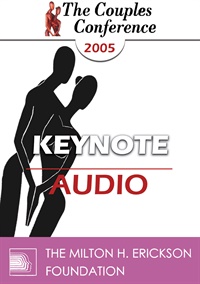CC05 Keynote 02 - Relational Empowerment: A New Model for Couples and Couples Therapy - Terry Real, LICSW
- Average Rating:
- Not yet rated
- Topic Areas:
- Keynotes | Couples Therapy | Relational Life Therapy Model (RLT) | Relationships
- Categories:
- Couples Conference | Couples Conference 2005 | Pioneers in Couples and Family Therapy
- Faculty:
- Terry Real, LICSW
- Duration:
- 53:44
- Format:
- Audio Only
- Original Program Date:
- Mar 04, 2005
- License:
- Never Expires.
Description
Description: Introduces Relational Empowerment Therapy, a model for modern relationships that addresses emotional imbalance between partners. Focuses on helping less dominant partners challenge unhealthy dynamics through direct confrontation, naming behaviors, and building empathy. Highlights the roles of grandiosity and shame, offering practical tools like precise feedback and functional skill-building. Encourages therapists to speak truth with compassion and humility.
Syllabus Description: For the first time in history, empowered women are asking for emotional intimacy in their relationships. Many men are coming up short leaving them unfulfilled, frustrated, bewildered and unloved. Traditional therapy sidesteps this basic asymmetry - Rational Empowerment Therapy addresses it. In this address, participants will be introduced to the art of relational empowerment. This radical new approach to intimacy and couples therapy will look at the five losing agendas that waylay good people from fulfilling their goals. This address also will introduce participants to the fundamental techniques of Terry Real's Relationship Turnaround, a method of producing quick, profound and permanent change in troubled couples.
Educational Objectives:
- To name five losing agendas.
- To describe a method to get to the heart of a problem quickly.
*Sessions may be edited for content and to preserve confidentiality*
Credits
Handouts
| Timestamped Transcript (700.3 KB) | 14 Pages | Available after Purchase |
| Ericksonian Learning Snapshot (249.7 KB) | 2 Pages | Available after Purchase |
Faculty

Terry Real, LICSW Related Seminars and Products
Terry Real, LICSW, is a nationally recognized family therapist, author, and teacher. He is particularly known for his groundbreaking work on men and male psychology as well as his work on gender and couples; he has been in private practice for over twenty-five years. Terry has appeared often as the relationship expert for Good Morning America and ABC News. His work has been featured in numerous academic articles as well as media venues such as Oprah, 20/20, The Today Show, CNN, The New York Times, The Wall Street Journal, Psychology Today and many others.


